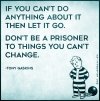Why would it take 10,000s of dollars to defend myself?
If they sue me, what would it be for? What law might I be violating?
WE all need to know when to restrain ourselves.
Restraint often allows a person to avoid uncomfortable, complicated, difficult predicaments.
Bad mouthing, criticizing, accusing others often leads to becoming a defendant in a civil lawsuit.
Being publically accused of a
crime one did not commit is torture, and once the information is out there, trying to defend yourself, clear your name, fight suspicion, and tolerate disdain makes for a horrible predicament.
People with little information can form strong opinions and take unwarranted retaliatory action from expulsion from the clan to spreading the false word. In
Jane Eyre, the cruel headmaster tells the girls to let no one be her friend, take her hand, or comfort her. You get the sense that this is the worst
punishment for Jane, worse than the head blow or the lack of bread.
If accusations are not true, a person is in a situation similar to being bullied. Even if one is rich, successful, famous, or "has it all," the psychological devastation can be ruinous. If you are not believed, if you cannot fight back with the true story, if now you are distrusted and under scrutiny, the sense of helplessness is overwhelming. People with inner vulnerabilities are easy targets. Others sense the fragility and find it thrilling to gang up or attack. Having a scapegoat can help a group form a strong bond and find meaning in what could be otherwise empty lives.
Freud said that the pain of the ego is the worse kind of pain. Kids who are scapegoated with words that cause unbearable
humiliation sometimes commit
suicide. A supervisor in analytic school told me that kids who are tortured with words are often more traumatized than those who have been physically abused.
It is widely known that people with certain kinds of pathology are brilliant at looking like victims when they are actually perpetrators. They can ruin the life of an innocent person. You can see this on
Law and Order, learn it in Psych 101, or just intuit it instinctively.
When you hear a story, consider the narrator. Who is this person? Why is she telling this story when she is? What feelings does she convey when she tells it? If there was true victimization, then the wish to retaliate is utterly understandable. You as the listener may feel like crying too. But what if the true story is not as it seems? You might feel a strange lack of empathy. Sometimes people dramatize. Some people lie or feel so injured for rational or irrational reasons that they come to believe their own distortions. There are those who are at peace when they lie and those who toss, turn, and torture themselves about doing so. In short, some people lie and some do not.
You might wonder, as you listen, if this person is truly seeking wellness, self-protection, or justice, or if the goal is simply to destroy someone else? If a person is
lying to hurt someone else, it is a highly aggressive act and the accuser needs help. Such choices do not foster a healthy existence with generous, loving relationships.
You might hear a tale of woe, and just have the feeling that the teller is not all that woeful. Maybe there is a need to blame or malign for secondary gain:
attention, fame, money, importance or drama. Maybe the person is not in touch with reality and is retaliating against an imagined transgression. Some seemingly intact people can have paranoid fears at the core. In order to "defend" themselves, they act against others. Maybe the goal is to take someone else down for competitive, regressed, or even
unconscious reasons. They just want what the other one has.
Making a false accusation in a public way is an aggressive act. In the movie
The Bad Seed, a
sociopathic child has an angelic demeanor yet manages to destroy many lives. Sweet faces, soft voices, and tears can hide
sadistic impulses. If you know someone like this, the best thing you can do is steer clear and build up your own life in a positive, separate way. Time takes away the sting, people eventually figure out the truth, and recovery is possible. You may be stronger, better, and savvier after you get out from under this mess you did not create.
I once attended an event where the speaker said some people are brought into this life to build, and others to tear down.
Recovery is possible.

www.psychologytoday.com
Suing Someone for False Accusations
Have you been falsely accused of committing a crime? The shock of such an accusation is indescribable, but it can be terrifying and heartbreaking, to say the least.
A false accusation isn't just scary. It can destroy your entire life, haunting you for years or even decades. In the worst circumstances, a false accusation could put you in jail or take your life. And it feels like there is nothing you can do about it when it happens.
The last part couldn't be further from the truth. You have the right to defend your reputation in court after a false accusation. The harm caused by that false accusation is real, and you can recover damages by suing someone for false accusations.
While you may be suffering under a cloud of suspicion due to false accusations, at least one law firm has your back. The defamation of character attorneys at the law firm of Morgan & Morgan will help you sue someone for false accusations. Contact us today to get a
free case evaluation as soon as possible.
It isn't hyperbole to state that a false accusation can destroy your life. A false accusation at work could cost your job and prevent you from getting one in the future. A false accusation of infidelity could cost your marriage. And a false accusation of committing a crime could end up with you spending years in jail for something you didn't do.
Worst of all, even if you manage to avoid the worst consequences of a false accusation, the damage to your reputation is almost impossible to repair.
Some people become aware of the false accusation, believe it to be true, and then never hear the truth. You can permanently lose friends, family, and opportunities due to a false accusation even if you prove that it was false.
Because you suffer these consequences despite the accusation being false, your accuser should also suffer consequences. Suing someone for false accusations is one of the most effective ways to make sure the accuser suffers for making the false accusations.
Even if you can't fully restore your lost reputation, you can get enough money to help make up for the damages you suffered. That money will help pay for the lost wages, opportunities, and other losses you suffered from the false accusation.
A defamation of character lawyer can't help you restore lost friendships or broken marriages. And for that, we are sorry. But we can get you the resources you need to return to a more normal life.
A false accusation is always a civil infraction. But in some cases, it can also be a criminal act as well. Whether it is a criminal act depends on the circumstances and behavior of the accuser.
If the accuser falsely accuses you of a crime to government authorities (like the police), they have engaged in a criminal act. It is illegal to knowingly falsely accuse someone of a crime to the authorities. The punishment for this crime differs in every state, but it is often a low-level felony.
The most heinous example of this is the act commonly referred to as "swatting." This is when someone falsely accuses someone else of currently committing a crime that threatens another party.
The purpose of this is to get the police to immediately arrest the individual, potentially using deadly force to do so. Swatting can result in the death of the person falsely accused if circumstances play out poorly.
If your accuser has committed a crime, the criminal justice system will take the lead on your case. You will likely have to file a complaint, but other than acting as a witness in a trial, you won't need to do much for the perpetrator to be punished.
However, regardless of whether a false accusation is a crime, you also have the right to file a lawsuit for that behavior. Suing someone for false accusations requires you to hire defamation of character attorneys, like the ones at Morgan and Morgan.
Once you hire us, we can handle most of the legal process, but we can't do anything for you until you retain our services.
As soon as you hire an attorney, you should expect your lawyer to immediately take steps to protect your rights and recover damages for you.
Right from the start, your attorney will advise you on what details of your case you can safely share and who you can speak with. Follow this advice carefully because it could cost you money if you don't.
Then, your attorney will collect evidence for your case. Your attorney is looking for:
- Witnesses to the false accusation
- Proof that you didn't commit the act you were accused of
- Proof that the accuser knew you didn't commit the act
- Records that reveal what losses you suffered from the accusation
- Anything that shows how much the accusations spread
- Evidence that people believed the accusations and acted upon that belief
With that evidence in hand, your attorney can take action. Usually, your lawyer will start by sending a demand letter. This letter informs the accuser that you have proof of their malicious action and requires them to cease spreading the false accusation and recant publicly.
The main goal of this letter is to prevent further damage, though it also acts as notice for the accuser that you intend to sue if they don't agree to your demands.
Next, your lawyer will probably try to negotiate a settlement. If the false statements are retracted quickly, the damage should be minimized.
At that point, it is usually best to agree to a swift settlement that gets you fair compensation for the harm (both past and future) suffered from the accusation. This quick resolution should end your stress and let you move on with your life.
The worst-case scenario is one where you need to go to trial. If the evidence is strongly in your favor, you should expect to win at trial, but success is never guaranteed.
Even worse, trials take a long time and bring a lot of publicity to the accusations. You might get awarded a lot more money for winning the trial than you would from a settlement, but the accusations are more likely to hang over you for the rest of your life if you need to go to trial.
This won't stop your attorney from going to trial if that is the only option. Winning a trial is preferable to backing off and letting the false accusations go uncontested.
The harm caused by that false accusation is real, and you can recover damages by suing someone for false accusations. Morgan & Morgan will help you sue someone for false accusations.

www.forthepeople.com




